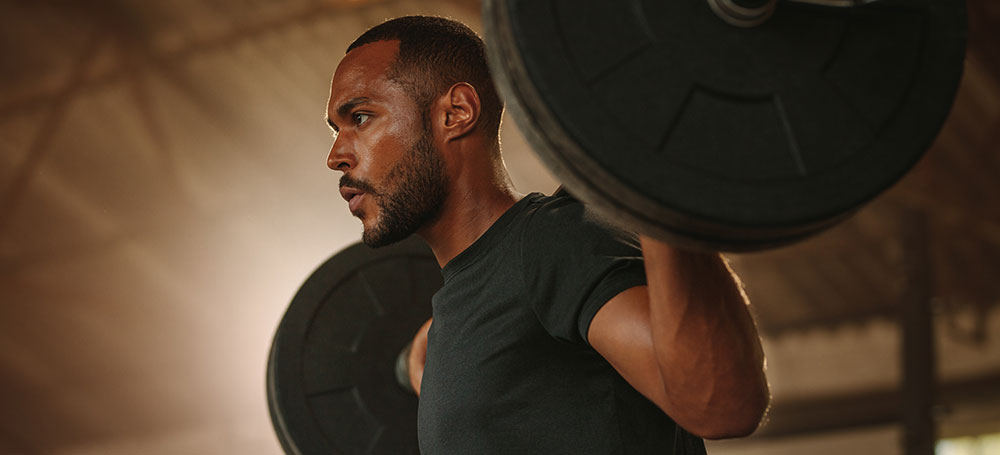Whether you’ve spent hours in the gym or tend to spend most of your time behind a screen, you’ve undoubtedly checked out your muscles in a mirror from time to time. (We all do it.) And if you’re getting older, you may be a little concerned that your physical strength and physique aren’t what they used to be.
Your muscle mass is intricately connected with your whole-body health — and yes, it tends to flag a bit as you get older. That’s because your body starts to produce less testosterone once you hit your 30s, decreasing at an average rate of about 1% per year. Over time, that can result in a lot of changes that make themselves known in every area of your physical, mental, cognitive and sexual health.
Loss of muscle mass can even be an outward sign of hard-to-detect things going on inside your body. Many of those have to do with your testosterone levels. Keep reading to learn more about how muscle mass and testosterone are related and what you can do if you have concerns about a decrease in your physical strength.
Muscle Mass Is Tightly Linked to Testosterone Levels
Muscle mass and testosterone are closely linked in a sort of mutual admiration society in your body. The more lean muscle mass you have, the more testosterone your body produces. And the higher your testosterone levels are, the more lean muscle mass you can produce and maintain.
Of course, your muscle mass also depends on how you use and treat your body. When you do significant amounts of strength training and resistance training, thereby stressing your muscles, your muscle mass increases and your body stimulates the production of testosterone. And when you eat plenty of high-quality protein, you also increase your muscle mass.
Increased levels of testosterone, including through testosterone replacement therapy, have been shown to increase muscle size and decrease fat levels. Conversely, men with lower testosterone levels have difficulty increasing their strength and building muscle mass, and they’re likely to see their muscle mass decrease.
But the Relationship Between Testosterone and Muscle Mass Is Complex
However, the relationship between muscle mass development and testosterone isn’t as straightforward as “testosterone in, muscles out.” Some men are genetically prone to building strong muscles. These men, who have high levels of androgen receptors, have bodies that are primed to use testosterone to build muscle. Testosterone binds to these androgen receptors to keep muscles strong. If your body is especially sensitive to testosterone in this way, you’re likely to find it easy to increase your muscle mass with just a little effort.
But that doesn’t mean the situation is hopeless for men who don’t have this genetic sensitivity. A study reported in the New England Journal of Medicine reported a clear link between supplemental testosterone and increased muscle — and the men in the study were doing weight training only three days a week. That means you can take steps to increase your muscle mass, no matter what genetic hand you’ve been dealt.
Muscle Mass Helps You Keep Weight Under Control
Muscle burns more calories than fat. How often have you heard a trainer intone this at the gym? It’s true. Muscle burns far more calories than fat does. And once again, testosterone is involved. When your muscle-to-fat ratio starts to sag, you gain fat. The adipose tissue that makes up fat releases the female hormone estrogen. In fact, excess fat cells contain an enzyme that converts testosterone into estrogen, throwing your testosterone balance out of kilter even more.
To make matters worse, your metabolism slows down since it’s no longer trying to maintain your muscles. Because your metabolism is slowed, you’re likely to take in extra calories without realizing it — and your body will now store those calories as fat rather than turning them into energy to fuel your muscles. As you age, that extra fat is likely to plant itself right around your belly.
By keeping your muscle mass strong, you break this vicious cycle. The more muscle you have, the more calories you burn, and the easier it becomes to maintain a healthy weight.
Muscle Mass Strengthens Your Bones
When you hear the word “osteoporosis,” you probably think of an ailment common among older women. However, did you know 30% of all broken hips resulting from frail bones occur in men? That’s because the loss of bone density that results from osteoporosis is also a side effect of the decrease in testosterone levels that occurs with aging.
Healthy testosterone helps protect against bone loss — and strong muscle mass does as well. As you do your resistance and strength training to build up muscle, you’re also strengthening your bones. The greater muscle mass you have, the more you put pressure on your bones, which in turn causes your bones to keep producing new bone cells.
Testosterone, once again, is key here. Higher testosterone levels are proven to increase bone density in the spine and the hip — two parts of your skeleton that must remain strong if you’re to remain healthy and vigorous as you age.
Muscle Mass Increases Slowly (But Testosterone Helps)
You’ve probably spent enough time at the gym to know that muscle mass builds slowly but surely. The lower your testosterone levels are, the slower the process becomes. If you increase the amount of testosterone in your body through testosterone replacement therapy, your muscles will naturally increase more quickly.
Muscle Mass Decreases With Age
Just as your testosterone levels drop gradually with age, your muscle mass decreases as well. That’s the reason it’s rare to see an older man, say in his 50s or more, with the cut physique of a 20-year-old. However, just because loss of muscle mass is normal with age, that doesn’t mean you have to accept it or settle for it.
Low Testosterone Levels Result in Low Muscle Mass
If your testosterone levels actually fall below the normal range of 300 to 1,000 nanograms per deciliter, you may experience noticeable muscle wasting. Even before that symptom of testosterone deficiency makes itself known, you’re likely to experience decreased energy, fatigue and overall weakness. Low testosterone levels also result in increased belly fat — and we’ve already seen how fat deposits can deplete testosterone levels even more in a vicious cycle.
Working Out Makes a Difference (But It May Not Be Enough)
Yes, you need to work out to build muscle mass — but all the strength training in the world won’t do much for your body if your testosterone levels are low. Once your testosterone levels are securely within the normal range, you can see the effects of those workouts over time.
When men with testosterone deficiency treat their condition via testosterone replacement therapy, they find themselves bulking up on muscle and losing fat. But if testosterone levels are low, exercise and diet alone won’t bring about the changes you’re hoping to see, as a 2012 study showed.
You Have Several Options to Boost Your Muscle Mass (But Some Are Safer Than Others)
Many men try to push back against their loss of muscle mass by ramping up their workouts. Certainly, you can’t build muscle mass without some kind of resistance or strength training — but as we’ve already seen, if your testosterone levels are low, your body isn’t going to get the results you’re hoping for, no matter how hard you work out. Eating a high-protein diet and having plenty of sex also can provide modest boosts to your testosterone levels, but probably not enough for you to see a physical result in your muscle mass.
Some men turn to anabolic steroids to boost their muscle mass. These drugs artificially increase testosterone and muscle mass, doing so in a way that can be very dangerous, often pushing testosterone into overly high ranges that have a negative effect on the body. Men who take anabolic steroids are likely to experience extreme mood swings and aggression, severe acne, erectile dysfunction, permanent nerve damage, liver damage, blood clots and other dangerous side effects.
Men who have low testosterone levels can turn around the decline in their muscle mass effectively through testosterone replacement therapy. When delivered by a trusted men’s clinic such as Boston Vitality, which provides regular monitoring and medical supervision, this treatment is safe and has a proven track record of helping men see an improvement in their muscle mass.
Testosterone Therapy Helps With More Than Muscle Mass
If you’re suffering from testosterone deficiency, you’re likely to be experiencing far more than just a decrease in your muscle mass — though that is certainly one of the most well-known signs of low testosterone levels.
You may also be experiencing erectile dysfunction and a loss of your sex drive. You might be dealing with mood swings, depression and irritability. In addition, testosterone deficiency can result in insomnia and plenty of cognitive symptoms, including forgetfulness, brain fog, an inability to focus and loss of concentration. In addition, you may have other changes occurring in your body that you’re not even aware of — such as the loss of bone density that can result in osteoporosis and broken bones.
You can turn the tide around on all these symptoms by seeking out testosterone replacement therapy. You don’t have to age quietly, watching your muscles and body shrink away with each passing year. Testosterone replacement therapy is available in several delivery systems, and you can choose the method that most suits your lifestyle and personal preferences. You can stop the gradual decrease in muscle mass — and in your quality and enjoyment of life — by seeking out the help that’s readily available.
Is Testosterone Replacement Therapy Right for You?
The symptoms of low testosterone are not pleasant or positive — and loss of muscle mass is key among them. If you’ve been wondering why you seem to be getting physically weaker or less cut or why your workouts seem tougher than they used to, then it may be time to get your testosterone levels tested.
At Boston Vitality, we’re ready to help men in Boston find the right way to deal with their discomfort and symptoms. We specialize in optimizing your hormones to maximize your opportunity for fat loss and muscle gain, while also boosting your energy levels, mental focus, emotional stability and sex drive. Our experts can take you through the testing protocol that helps determine whether testosterone replacement therapy is the right choice for your body and your lifestyle, and we guide you through every step of the process, keeping an eye out for your health and well-being as you regain your muscle mass.
We want you to lead your best life with the body you remember from your younger days and the wisdom you’ve accrued since then. Contact us today to see how we can help you regain muscle mass and physical strength.


